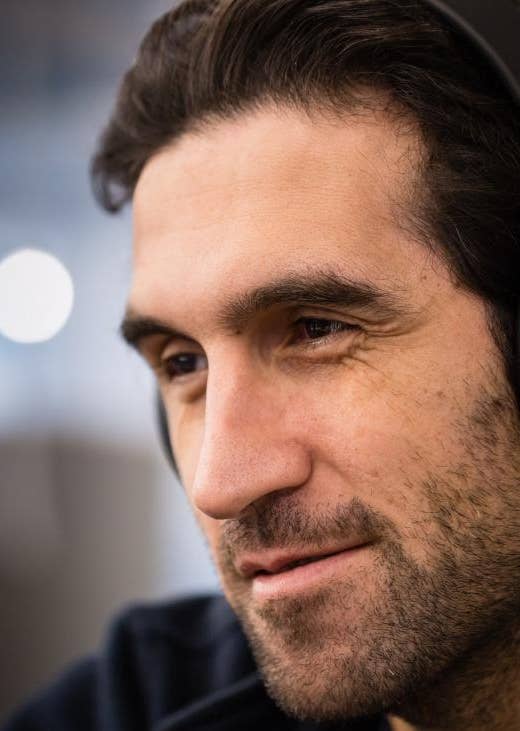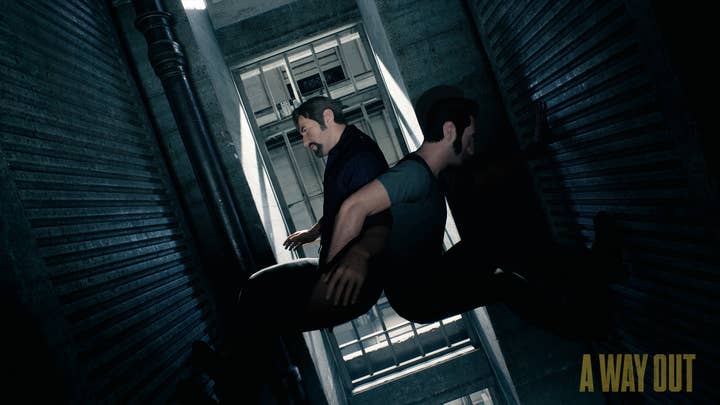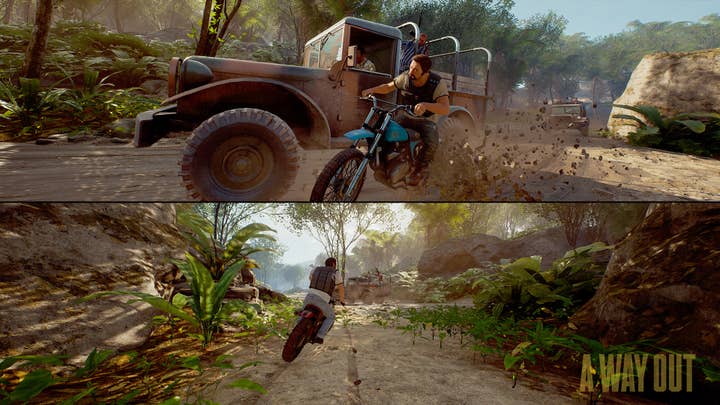Josef Fares hopes A Way Out inspires more risks in AAA games
The director also discusses his relationship with EA, and ambitions to follow in the footsteps of Naughty Dog
While surreal adventure Fe was notable for being the first release from EA Originals - the publisher's initiative to fund and publish indie games - the latest title is perhaps the most significant.
A Way Out, which arrives on shelves today, is the debut title of Hazelight Studios, the Swedish studio formed by director Josef Fares and much of the team he worked with on the acclaimed Brothers: A Tale of Two Sons.
It tells the story of two reluctant companions as they plan a jailbreak and try to avoid the authorities as they return to their families. Some of the many unusual aspects of this release are the fact that it's only playable as a co-op game (ideally for couch players, but online is also an option), and for every copy sold, gamers are able to gift a free copy to a friend in order to ensure they have someone to share the experience.
The innovation continues right down to the game's design, with the action frequently changing from vertical to horizontal split-screen, same screen co-op sections, and even one chapter that gives players a full screen perspective as the action (and control) jumps from one character to another.

In fact, Fares confidently declares that no two gameplay sections are alike. So in contrast to most AAA games, where the mechanics are largely the same throughout a 20 to 40-hour experience, each chapter has its own flavour - whether that's stealth, side-on brawling or even fishing.
Speaking to GamesIndustry.biz, the director told us his dream is that A Way Out - and the fact that EA has supported such a title - encourages more innovation from the increasingly stagnant franchises that currently lead the market.
"It would be good for all publishers to take more risks," he says. "I hope this inspires more AAA titles to improve their writing, the gameplay. I hope we show that yes, you can take risks and you can do well. I mean we'll probably do less well because we give one copy away for free [per player], but that doesn't really matter. At the end of the day, it's a good way of testing stuff."
He continues: "I love taking risks. Like the fact this is co-op only - from the beginning, people were like, 'Isn't that risky? Won't you sell less?' I don't care. That's the vision, so I will follow it."
It's not just the publishers' responsibility to bring unusual yet high-profile titles to the market. Fares stresses that studios need to prove they can be trusted to step outside the comfort zones of AAA gaming, that there is a clear motivation behind the risks they take.
"Publishers, developers, journalists, players, everybody - we all need to work together to push [forwards]. Isn't that what we all want: better games?"
Using A Way Out as an example, Fares tells us the co-op only design stems from times where he and a friend struggled to find games their could play together that aren't a drop-in, drop-out affair with interchangeable and ultimately meaningless characters.
"There are two sides to the coin here," he says, returning to the topic of risk. "If you just let developers do whatever the hell they want, it will cost a lot of money. Something that's been missing, but is becoming more and more common, is to have a very clear vision from the beginning. Games are expensive, so you can't have an attitude of 'yeah, let's fuck shit up'. I take my job very seriously. If you're giving someone $100 million, you want to know that what you get back is actually good. There has to be an understanding, a trust from both sides.
"I would use Sony and Naughty Dog as a good example of that relationship. Big publisher, really big budget games, but Naughty Dog still take risks - from what I understand The Last of Us was a risk for them, because it was a new IP, but there was a respect and understanding from Sony. They believed the team could pull it off. That's a relationship I would love to have, and I think that's a relationship that would be healthy for everyone.
"I'm not blaming anyone, I just think we all have responsibilities in this. Publishers, developers, journalists, players, everybody - we all need to work together to push towards a better gaming community. Isn't that what we all want: better games?"

His admiration for Naughty Dog evidently shows in some of the gameplay design behind A Way Out, something media and playtesters have picked up on. With the might of EA behind Hazelight, Fares is conscious that it may have escalated expectations somewhat - yet this hasn't discouraged him from trying to meet them.
"We have [the equivalent of] the coffee budget for an Uncharted game. But that doesn't stop us. We're a small team with high ambition"
"The good and the bad thing about this is people have been comparing this to AAA," he says. "I've even heard people saying it's like an Uncharted for two players. But you have to understand that their budget... I sometimes joke that we have [the equivalent of] the coffee budget for an Uncharted game. Of course they're going to have better animations and so on. But that doesn't stop us. We're a small team with high ambition. That's how I work. Whoever I work with in the future, however big the game I make is, that's how I work, because I need to feel the passion about what I do.
"This was the perfect opportunity. EA has only been supportive. And no, I'm not getting paid to say this - that's my honest opinion. I'm not scripted, I say what I want to say. I could show you the contract. There are no tricks, nothing weird about it. I know that's hard for people to understand, but that's the way it is."
His vehement defence for his publisher is an ongoing narrative for Fares. When interviewed at The Game Awards before Christmas - in the wake of the Star Wars Battlefront II controversy - the director observed that "all publishers fuck up sometimes" and stressed that EA's fondness for long-term loot box-driven revenues would not affect A Way Out. Several months later, he believes the vitriol towards Electronic Arts was somewhat disproportionate.
"EA obviously have this reputation of being hated, but I haven't had any problem at all," Fares tells us. "They sure have fucked up at some point - like with the latest loot box thing - but so do all other publishers.
"What people have to understand is when you're running a large publisher with shareholders and all that, there are a lot of responsibilities"
"What people have to understand is when you're running a large publisher with shareholders and all that, there are a lot of responsibilities. I would never want to do that, I'd never want responsibility like that. But they have to find ways to make money and stuff like that, so of course bad decisions will be made but that goes for everybody."
He goes on to say that pleasing shareholders is not the only thing that puts him off the idea of going AAA: "I can be super creative and very risky with a game like A Way Out because it's very cheap, it's an indie production. If I were AAA, I would still make something risky but I would have to understand there's an economical aspect to it - games are very expensive today. You couldn't just take $100 million and go 'right, I'm going to do this my way, fuck everyone else' - it doesn't work that way. There has to be an understanding."

Interestingly, it very nearly wasn't Electronic Arts that got to publish A Way Out. Fares tells us the game was almost an Xbox exclusive.
"I was actually quite close to signing with Microsoft, I was super close," he says. "After Brothers, I got more opportunities but Patrick [Soderlund, EVP for EA's Worldwide Studios business] came, and they were based in Sweden - so that worked better for me, and that's how it all got started."
"A guy like me is very scary for shareholders, but if you truly believe in this creative industry like I do, risk is essential"
He was also won over by the promise that, as with any EA Original, the publisher will have no creative control, no input and won't even earn a single dollar out of each release. In light of this, did Fares still feel a need to show the firm what he was working on?
"Yeah, of course," he says. "It's a normal discussion. When they have a question, I answer. If they have an idea I don't like, I say no. Not a single detail in A Way Out has been decided if I don't say yes to it."
This is another crucial aspect to building a relationship that allows companies to take more risks in games: trust. And that trust is best forged by developers delivering what they promise.
"That's important," Fares stresses. "That's what we do: we've delivered every milestone, and they see that we're not just bullshitting, our game is actually happening. I'm not going to talk about actual budget, but what we have done for that money is record-breaking. We've done everything ourselves, no outsourcing or anything like that, and it still looks good. It's not AAA, but it still looks good."
The Hazelight team had an advantage given the positive reception seen by Brothers, but Fares is confident other developers can earn the respect and trust needed from publishers to maintain creative control of their projects. The key is, as mentioned, delivering on your promises and having a clear vision as to what you are trying to accomplish.
"Have an understanding of what kind of risks you are able to take," he advises. "It's about communicating, talking, trying to understand what you want to make and also daring to take risks. This industry... is in need of different kinds of AAA titles and we need to push the creative boundaries forward. We can't do that without any risk.
"There should be more risk [in AAA], and it can be done. Naughty Dog is a good example. You don't have to go all the way, just a little bit at a time. A guy like me is very scary for shareholders, but if you truly believe in this creative industry like I do, risk is essential."
